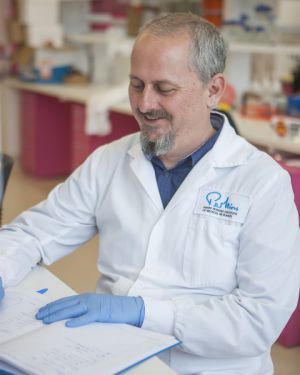
A landmark study mapping a poorly understood and highly controversial class of genes, known as long non-coding RNAs, has found evidence of evolutionary selection and links with major diseases, including cancer.
The findings, published in Nature, were the latest work of the FANTOM5 consortium, a group of researchers from Japan and Australia led by Professor Alistair Forrest from the Perkins and The University of Western Australia.
The work involved generating a comprehensive atlas of 27,919 long non-coding RNAs and summarised, for the first time, their expression patterns across the major human cell types and tissues.
By intersecting this atlas with genomic and genetic data, their results suggest that 19,175 of these RNAs might be functional, hinting that there could be as many, or even more, functional non-coding RNAs than the approximately 20,000 protein-coding genes in the human genome.
“There is strong debate in the scientific community on whether the thousands of long non-coding RNAs generated from our genomes are functional or simply by-products of a noisy transcriptional machinery.” says Professor Forrest.
“By integrating the improved gene models with data from gene expression, evolutionary conservation and genetic studies, we find compelling evidence that the majority of these long non-coding RNAs appear to be functional, and for nearly 2,000 of them we reveal their potential involvement in many genetic traits including predisposition to heart disease, obesity, depression, autoimmunity and various cancers.”
Professor Forrest who heads the Perkins Systems Biology and Genomics laboratory and Associate Professor Timo Lassmann (a co-author on the paper) at the Telethon Kids Institute both relocated from RIKEN Japan and maintain strong links there as visiting scientists. The importance of such international links were acknowledged recently with the FANTOM5 team being awarded the 2016 Eureka Scopus prize for Excellence in International Scientific Collaboration.
Professor Forrest who is funded by the Perth based Cancer Research Trust (CRT) and by funds raised by the annual MACA Ride to Conquer Cancer said, “It is a very tough time for Australian medical researchers. Funding is at record low levels and many highly talented researchers are in despair; quitting science or heading overseas. Philanthropic funding from groups like the CRT and the ride are becoming key to the survival of medical research in Australia.”
Other Australian based authors in the Nature paper were Dr Alison Testa at the Harry Perkins Institute of Medical Research; Dr Dave Tang at the Telethon Kids Institute and Professor Christine Wells at the University of Melbourne.
The publication is another important milestone for the FANTOM consortium, which in 2014 and 2015 used CAGE technology to build atlases of the promoters and enhancers in our genomes.
